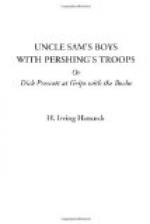Brigadier-General Bates arrived to take command of the regulars, while Major-general Timmins assumed command of the National Army division and became commanding general of the camp as well.
New batches of recruits, constantly arriving for the regulars, soon gave the Ninety-ninth an average of a hundred and eighty men to the company, or forty-five men to each platoon. Drill went on as nearly incessantly during daylight as the men could endure.
“In my opinion it won’t be very long before the Ninety-ninth goes over and reports to General Pershing,” Dick told his chum. “At the rate our ranks are being filled up we’ll soon have a full-strength regiment.”
“But most of our men are still recruits,” Holmes objected. The regiment really isn’t anywhere near fit for foreign service.”
“It won’t be so many weeks before we’re ordered abroad,” Dick insisted. “Wait and see whether I’m right.”
Wonderful indeed was the speed with which buildings were erected. The record time for constructing a two-story building with an office, supply room, mess-room and sleeping quarters for two hundred and fifty men was ninety minutes!
Fast, too, was the work done by the Regular Army regiments, which had this advantage over the National Army regiments, that most of their officers were trained regulars and a large proportion of them West Point graduates.
Of the sixteen men made ill by eating powdered glass not one died, for the glass had been ground too fine to do the utmost mischief. However, the camp was alarmed, and all food was kept under close guard and was regularly examined with care before being served.
Soldiers bearing German names were in some instances suspected, and unjustly. Officers tried to undo this harm by talking among the men. Yet all wondered what would be the next outbreak of spy work in camp.
Private Mock, sentenced to two weeks’ arrest for being off the reservation without leave, served his sentence moodily, usually refusing to talk with his fellow-prisoners.
One Private Wilhelm was also serving a term in arrest at the bull-pen. His name was held against him Wilhelm as a brand-new man in the regiment, and one of the few with whom Mock would talk.
One morning the latter was overheard to say:
“I’m sick of this war already. I hope the Germans win. If I’m sent over to France I’ll watch my chance to desert and get over to the Germans.”
“Oh, ye will, will ye?” demanded Private Riley, another prisoner in the bull-pen. “Ye dir-rty blackguard!”
Buff! The Irish soldier’s fist caught Mock squarely on the jaw, sending him squarely to earth, though not knocking him out. After a moment Mock was on his feet again, quivering with rage. He flew at Riley, who was a smaller man, hammering him hard. Other soldier-prisoners interfered on behalf of Riley, whereupon Private Wilhelm, a heavily built fellow, rushed to Mock’s aid.




